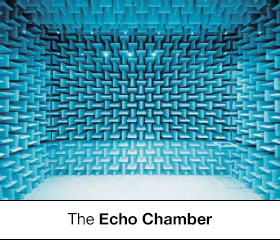How Germany Moves Out of the Programmatic Slow Lane
by Ciaran O'Kane on 30th Jun 2015 in News


The Echo Chamber is a regular column, penned by Ciaran O’Kane, on all things adtech, martech and programmatic.
Germany has two conferences focused exclusively on programmatic – one of which is a joint venture between ExchangeWire and Adzine, for full disclosure. Both have been going now for nearly five years. It's quite incredible really given how slow the market has been in the area of automated buying and selling during that time, in Germany.
The volumes of inventory being traded this way remain minimal.
There continues to be a lot of procrastinating from senior German ad executives at these industry gatherings about the assorted pros and cons of programmatic buying and selling. The main players are trying to stitch together an unsustainable and imperfect model to fit the German market.
The German way is best, it would seem – but it does not have longevity.
Why can’t constituent players adapt to the new realities of the programmatic environment? What factors might exact change in this rigid and inflexible market?
RTB Not Acceptable to Anyone – in Germany Anyway
In Germany, the market has turned its back on the RTB protocol. Nobody wants millisecond trades, it would seem. Instead, Germans have embraced the concept of Real Time Advertising.
RTA is effectively better workflow and little change on the existing model. Think automated guarantees with a sprinkle of first- and third-party data. It pays automation the minimum amount of lip service, while keeping an antiquated and backward media buying process intact.
Over the past 12-18 months, I have seen a lot of US ad tech companies invent products specifically for the German market. Some, as a result, have decided not to put too much resource into Germany as the returns are not worth it.
With German publishers stubbornly opting out of the automated process, Facebook and Google are stealing the march on the once-powerful German sales house.
Both are growing programmatic revenues at the expense of the sales house – and with the Atlas bidder coming to market in Q4, or Q1 of 2016, things are only going to get a lot worse for German players.
Bypassing Germany’s Chronic Kickback Culture
Media kickbacks have been the subject of much discussion of late in the trade and financial press.
Some in the industry, as illustrated in a recent investor letter by Brian Weiser, believe that this is one of the key reasons that there are so many global accounts out for pitches at the minute.
Given how much media buying agencies are giving away in revenue just to win these accounts, it is no wonder they have to engineer margin elsewhere.
Anybody denying that this is a reality in our industry is deluded. Getting rid of the kickback would result in many agency businesses going bust. That’s not hyperbole, it’s just an economic fact. It is quite amazing that more senior industry figures are not having grown-up conversations about this publicly.
If the situation is murky in more mature markets, it is even more obvious in Germany. I have heard anecdotal evidence of some agencies operating tiered kickback processes: the more spent, the more returned as a media fee.
Working in German DR is littered with so many financial sinkholes. In this restrictive tiered system, vendors must optimise campaigns to both CPA goals and sizeable media kickbacks. If an actual profit is to be made, vendors must find .de inventory that is both cheap and of relatively decent quality.
This is not an easy task, given how much inventory is locked down by publishers. In that situation, who really benefits? Certainly not the brand or the German publishers.
This current system makes it easy to see why programmatic has not taken off in Germany. The introduction of price transparency would probably collapse it.
In the absence of a mainstream programmatic ecosystem, money is flowing into Facebook and the blind RTB market, which is effectively anonymised publisher inventory on Adx.
Programmatic is growing for two companies in Germany at least.
However, brands have had enough. Faced with an opportunity to buy media and leverage their own first-party data, many are now looking to internalise a lot of their buying and, in some cases, are building their own tech stack.
Programmatic is now being pushed aggressively by brands – and the market is taking notice.
A Powerful German Publisher Co-Op is Coming
Faced with the new economic realities, some of the top German sales houses are in talks to set up a publisher collective to compete with the might of Google and Facebook.
They have no choice. With no means to buy their inventory, programmatic buyers are going elsewhere.
They need a La Place model in place fast to mop up this growing programmatic spend.
The specifics of the negotiations are not known, but you can expect that individual sales houses will try to do PMP deals first, and then operate a backfill into a collective publisher exchange… with aggressive floors in place.
This would fundamentally change the dynamics of the German market, as it would provide badly needed RTB-enabled .de domain inventory for buyers.
German Agencies Need to Reboot Model
At most risk in this new programmatic dynamic are agencies. With brands now looking for transparency and data-driven solutions, agencies in Germany – as well as globally – have a current agency model that looks ill-equipped to deal with the shift to programmatic.
The economics just simply don't stack up. Agencies will have to alter their pricing structure. It is likely that they will be forced to move to performance-related metrics or a dynamic-pricing model on media bought.
More tech related solutions are required too – not clandestine media fees or black-box arbitrage.
Is the agency model robust enough to survive? You could argue that in some cases it might be more prudent to spin out certain pieces of the holding groups, like the media buying agency, with the view of building a new high margin business.
The evolved media buying agency needs to look more like a consultancy – while still having the core skills of optimising media buys.
It needs to have real competencies in data and technology to advise clients on digital marketing strategies.
The media buying agency of the future will ultimately look like an evolved Accenture model, with deep domain experience in martech, ad tech and programmatic.
Can programmatic finally take off in Germany?
The current model continues to be a hindrance, but market forces are slowly pulling Germany inexorably towards a transparent, data-driven, digital advertising marketplace.
Maybe next year those two programmatic conferences will finally have something real to talk about.
AdvertiserAgencyBrandingDACHDigital MarketingDisplayEMEAFacebookGoogleM&AMartechMedia SpendProgrammaticTargetingTechnologyTradingTrading Desk








Follow ExchangeWire